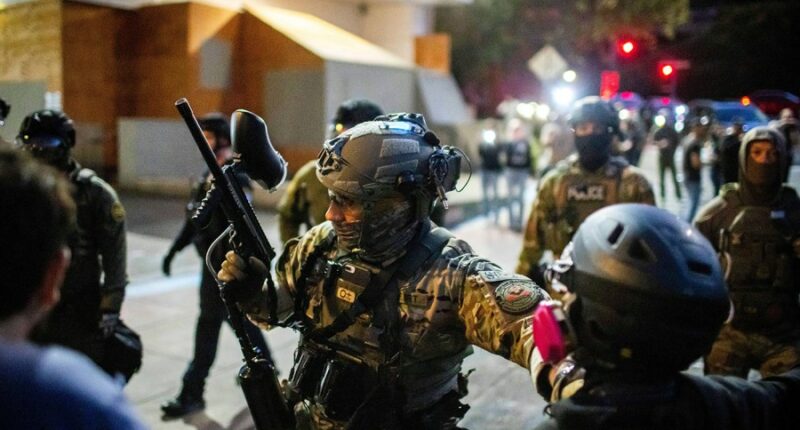Share this @internewscast.com

Republican senators are expressing growing concern over President Trump’s tensions with Democratic governors regarding the deployment of National Guard troops from other states to Portland, Oregon, and Chicago.
The clash between federal and state authorities intensified significantly over the weekend when Trump decided to send National Guard troops to Oregon and Illinois, despite the objections of their governors, Tina Kotek and JB Pritzker.
The controversy surrounding Trump’s use of military forces was heightened because a federal judge appointed by Trump in the District of Oregon ruled on Saturday that the administration could not mobilize Oregon’s National Guard to support Immigration and Customs Enforcement (ICE) activities in Portland.
While Senate Republicans aim to back Trump’s initiatives to curb illegal immigration, they expressed that the president’s actions are prompting serious concerns about states’ rights, presidential powers, and the precedent of deploying National Guard forces across state boundaries.
“I’m concerned about the possibility of a future Democratic president dispatching troops or National Guard units from states like New York, California, Oregon, or Washington to North Carolina. It establishes a worrying precedent,” stated Sen. Thom Tillis (R-N.C.).
“Considering this specific issue, it’s difficult to see how one could argue that this aligns with any traditional conservative perspective on states’ rights,” he further commented.
Tillis told Attorney General Pam Bondi at a Senate Judiciary Committee oversight hearing Wednesday that the cities and states should be handling local crime themselves.
“I’m having a real struggle right now with the National Guard being deployed and masking the abject failure of leaders at the state and local level,” he said.
Sen. Lisa Murkowski (R-Alaska) said she’s worried about the precedent of sending National Guard members from one state to another despite the objections of those states’ governors.
“It’s one thing if governors ask and they say, ‘Hey, I need help.’ That’s the way we’ve handled it before,” she said. “I am concerned, I am very apprehensive about the use of our military for policing and more the politicization that we’re seeing within the military.”
She said the use of the National Guard to respond to natural disasters when requested by the governor of a state makes perfect sense but warned that Trump is moving into a dangerous new realm.
“This is not the role of our military,” she said.
Murkowski said fellow Republican senators don’t want to clash with the president but are also sympathetic to states’ rights.
“We’re seeing these orders, we’re seeing a directive that is unprecedented and it should make us all concerned,” she said.
One Republican senator who requested anonymity said Trump’s attempts to circumvent restrictions on his deployment of National Guard troops in Democratic states raises “questions.”
“I don’t know it’s the best way to solve the issue, but it looks like in Portland, the place is on fire, but that could be isolated reports,” the lawmaker said.
“I think he’s just poking his finger in their eye,” the senator added, referring to the firestorm provoked by Trump’s aggressive use of guard troops in Democratic-leaning states.
Oregon District Court Judge Karin Immergut, appointed by Trump in 2019, accused the administration Sunday night of defying her order blocking it from federalizing 200 members of the Oregon National Guard to protect an ICE facility in Southwest Portland after a few dozen protesters showed up there.
Immergut on Saturday rejected the Trump administration’s argument that it needed to federalize Oregon guard members to protect the ICE facility in Portland and to enforce federal immigration law. She said the administration’s actions risked “blurring the line between civil and military federal power — to the detriment of the nation.”
When the administration pivoted by attempting to send 200 California guard troops to Portland despite California Gov. Gavin Newsom’s (D) objection, the judge warned during an emergency hearing Sunday night that the administration risked being “in direct contravention” of her order from Saturday. She also said Trump’s claim that Portland is “burning down” was “untethered to the facts.”
Oregon Sen. Ron Wyden (D), who noted the judge was confirmed with strong bipartisan support, said “there’s no question” that the Trump administration flouted Immergut’s Saturday order.
Sen. Rand Paul (R-Ky.) said he’s not a “fan” of deploying federal troops into American cities but argued there’s a “supremacy” of federal authority when it comes to protecting federal property.
He criticized Democratic mayors for supporting soft-on-crime policies, which he argued have triggered federal intervention.
“Look at Chicago, the murder capital of the U.S. People live in utter despair and they’ve voted for Democrats for 70 years,” he added. “It’s right for the president to point that out and to try to offer help. I think the Democrats would be better off actually accepting his help.”
Sen. Susan Collins (R-Maine), a moderate who is up for reelection next year in a Democratic-leaning state, pointed to Chicago’s “crime problem” and a “sky-high murder rate.”
But she said deploying National Guard troops “works much better when the governor is in concert” with the president.
“I do think the National Guard has an important role to play in natural disasters, in protecting federal personnel and federal sites. In those cases, you can justify nationalizing the guard,” she said. “Generally, this should be a police and law-enforcement action. It’s a complicated issue.”
Senate Majority Leader John Thune (R-S.D.) told reporters Monday that he was briefed on the deployment of California and Texas guard troops
“It was a request from the Department of Homeland Security and designed to protect law enforcement personnel and federal buildings … which is a justifiable use of executive branch authority there,” Thune said. “If there are federal personnel who are being threatened, then I think the president has a right to protect them.”
But Thune said he expects the Trump administration to follow judges’ rulings, noting that district court rulings will be appealed to the appellate courts and perhaps the Supreme Court.
Asked if officials should comply with orders against deploying guard troops, such as Immergut’s ruling handed down over the weekend, Thune said: “My assumption is … when it works its way through the legal process, whatever that decision is will be final.”












